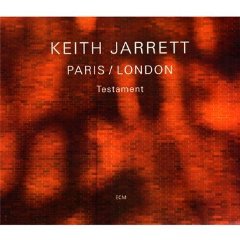
ECM
“Play like you think it’s going to be the last time. That’s the only way to play.” – Keith Jarrett
I believe it’s an unwritten rule (or maybe it is written down somewhere; I don’t know and it doesn’t matter anyway) that when doing an album review, you need to judge the music solely on its own terms. Never mind the story behind the recording; and certainly don’t get hung up on the liner notes – especially if written by the artist himself or herself. It’s an album review, not a book review, veteran critics will tell you.
Yeah, well … you’re not supposed to play jazz in jeans either, according to the advice that scolding saxmaster Rahsaan Roland Kirk once gave Keith Jarrett.
Now, believe me: I don’t harbor any illusions that I’ve paid the sort of dues in the editorial world that are akin to what Mr. Jarrett has done in the jazz universe (which earns him the right to play the piano while wearing anything he pleases, as far as I’m concerned). But seeing as how the subject we’re here to discuss is Testament: Paris/London, the latest solo piano release from Keith Jarrett, I’m going to break some rules in honor of the man himself.
I’m here to tell you that this would be a great album on any terms … but knowing the background story of these recordings makes it an incredible performance. Testament is an audio document of honesty, openness, courage, pain – and eventual triumph.
A three-CD set that captures a pair of performances from last year at this time (Paris on November 26th and London on December 1st), Testament finds Jarrett basically playing his way out of emotional collapse. In his liner notes – which are far more personal than what you’d expect from the usually-private Jarrett – he writes about his wife of 30 years leaving him in late ’08. The concerts, he admits, were part of a quickly organized attempt to stay busy, or “stay alive,” as he puts it. “I was in an incredibly vulnerable emotional state,” Jarrett writes, “but I admit to wondering whether this might not be a ‘good’ thing for the music. It truly didn’t matter; I had to do [the Paris and London shows].”
And so he did: two nights of solo improvisational piano; playing in the moment and letting his soul take him where it wanted to … and where it needed to. Paris hosted the first night of purging, beginning with a 13-minute movement that’s woven with threads of tension and ache, ending in a near-whimper. Jarrett attempts to find some peace as the night goes on, sharing some moments of cascading beauty while shedding some demons. Towards the end of the Paris set, there’s a bit of light … but after he plays a lovely ballad-like piece towards the end of the evening, Jarrett answers its softness with nine minutes of powerful, rumbling flurries of sound. There was still much work to be done.
The city of London was painful, “as close a brush with a nervous breakdown as I’ve ever had,” says Jarrett in his notes. The sight of couples doing their Christmas shopping drove Jarrett to hole up in his hotel with the curtains drawn, trying to pull himself together. Discs two and three are proof that he did. After a series of pre-show interactions with various people who “were giving off the exactly right thing,” Jarrett began to crawl out of the wreckage. “Communication is all. Being is all. People are deep, serious creatures with little to hang on to.”
As unsettling as the Paris show seemed to be at times (though brilliant in its way), the London performance is a clear victory. It’s hard work along the way as Jarrett’s hands channel his heart – but the beauty outweighs the darkness. Even the more atonal passages feel like Jarrett is testing himself, pushing himself, challenging himself – and finding that he’s up for it.
The last piece of the night borders on heavy-handedness in a gospel-like sort of way. There’s a joy that grows throughout the piece, with Jarrett letting the thing build like an old Stones rave-up. (You keep expecting the rest of the band – plus a full chorus – to join in at any moment.) By the time Jarrett brought the London show to a close, he was in tears – but a different man from the one that walked on the stage. No one in the audience that night knew what he was going through – but they had to know that they’d just witnessed a complete and total baring of the soul. They roared their approval as Jarrett made his way offstage, his arms and hands numb with pain from the pounding he’d given them.
Okay, so now you know how the movie ends – you’ll still find yourself rooting for Jarrett every step of the way. This is as honest and brutal as it gets in jazz, folks: listen as one of the gods crumbles, begins to fall, picks himself up, and eventually rises above it all – without a net.
Here’s to Keith Jarrett … we hope a year later finds him in a much better place. And we thank him for sharing his Testament.



No Comments comments associated with this post